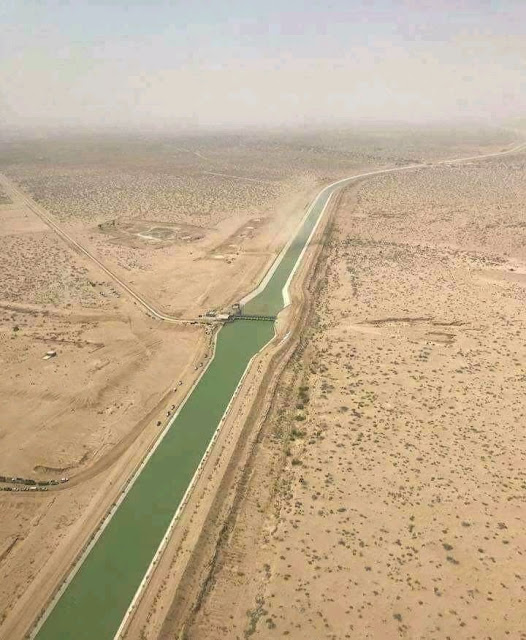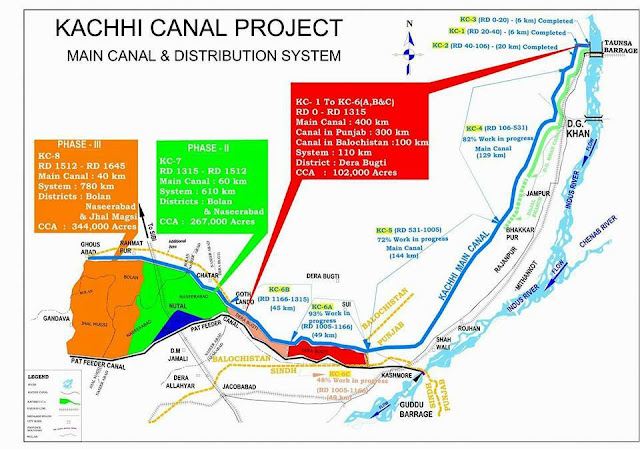PakAlumni Worldwide: The Global Social Network
East-West infrastructure projects in Pakistan pose unique challenges. Sending hundreds of cusecs of water up more than a mile from the River Indus to Balochistan via Kachhi canal is one of these challenges. Another challenge is to improve and expand national east-west highways like N-70. These recently completed infrastructure projects linking South Punjab with Balochistan will boost agriculture and transportation sectors and bring economic benefits to Pakistanis living in the country's least developed areas.
Kachhi Canal Project:
Recently completed 400 kilometers in phase 1 of 500 kilometer long Kachhi Canal is now the longest irrigation canal in Pakistan. It stretches from the plains of South Punjab to the heights of eastern Balochistan where it will eventually irrigate over 700,000 acres of arid land, according to WAPDA (Water and Power Development Authority).
Kachhi Canal Pakistan |
Part of Kachhi canal is made up of 56 inch diameter pipeline that will pump 120 cusecs (cubic feet per sec) of Indus water 7,000 feet above sea level across Sulaiman mountain range. This feat of engineering made possible by NESPAK (National Engineering Services of Pakistan), a consulting firm that I worked for 3 years in mid-1970s.
Kachhi Canal Project Phases |
National Highway N-70:
National highway N-70 runs from Multan in Punjab to the town of Qilla Saifullah via Dera Ghazi Khan, and Loralai in Balochistan province. It requires traversing 11,500 feet high Sulaiman mountains, the southern extension of Hindu Kush mountain range. It has recently been completed.
N-70 Highway Pakistan |
The condition of old British colonial era N-70 national highway was very poor. In particular, the hilly sections of the road suffered from frequent rock falls and debris and occasional land slides from the steep mountain side. It had narrow road width, coupled with hair-pin bends and relatively steep slope. Trucks pulling containers were forced to take alternative route via N-65 highway to Quetta. The solution was to use seven steel bridges that were 11.5 kilometers in length. The project was completed at a cost of $142 million with the assistance of JICA, Japan's international aid agency.
| Steel Bridges At Fort Monroe on N70 Highway |
Summary:
Recently completed infrastructure projects linking South Punjab with Balochistan will boost agriculture and transportation sectors and the economy in Pakistan's least developed areas. Kachhi canal will irrigate hundreds of thousands of acres of arid land while improvement and widening of N-70 east-west national highway will help movement of goods and people to integrate remote areas with the national economy.
Related Links:



Riaz Haq
Reko Diq pays $28 million to Balochistan in taxes
https://dailytimes.com.pk/1338235/reko-diq-pays-28-million-to-baloc...
Communications Manager Samia Ali Shah stated that by June 2025, RDMC paid $17.5 million in royalties, around $3.8 million in taxes collected from employees and partners, and $7.2 million toward social development programs. These payments highlight the project's ongoing commitment to the province's growth.
She clarified that the Balochistan government holds a 25% stake in the project. However, it has not made any direct investment so far. The project operates under a 50-50 partnership between the federal government of Pakistan and RDMC.
The briefing also shed light on the company's efforts to develop the local workforce. RDMC has taken steps to train youth from the region to help them gain technical skills and career opportunities in the mining sector.
Several young trainees, recently returned from Argentina after completing 18 months of technical training, were present at the event. According to Samia, 14% of these trainees were women, marking a notable push for gender inclusion in the mining workforce.
She added that this project holds long-term benefits for the region and is designed to uplift communities, build skilled human resources, and ensure sustainable economic development in Balochistan.
Jul 19
Riaz Haq
‘Generational benefits’ from Reko Diq mines will uplift conflict-hit Balochistan — Barrick CEO
https://www.arabnews.com/node/2608119/pakistan
“Reko Diq is not just a mining project; it is a multi-generational opportunity that promises sustained economic and social development for local communities for decades to come,” Barrick CEO Mark Bristow said in a statement on Monday released after he visited Humai, the closest village to the project site in District Chagai.
Bristow met local elders and development committee members, reaffirming the company’s goal to invest in job creation, skills training, education, and health care for Baloch communities.
“We are creating job opportunities not only through RDMC but also through our large network of partner and supplier companies that are coming onboard to support this major development,” Bristow said. “Currently, 75 percent of our workforce is from Balochistan — the majority from District Chagai — and we aim to continue strengthening this local representation.”
Bristow also highlighted recent investments in health care, including a new Mother and Child Health Center in Humai that offers maternal care services — the first such facility of its kind in the area.
“No meaningful development of this world-class mineral resource can happen without the active involvement and support of the people who live here,” he said.
Humai village chief Liaqat Malik and Par-e-Koh Community Development Committee Chairman Taj Muhammad thanked Bristow and RDMC for their engagement and development work, pledging continued community support for the project, according to the Barrick statement.
The Reko Diq project is expected to begin production by 2028 and generate thousands of jobs while significantly boosting Pakistan’s export revenues. The Pakistani government has said it will ensure environmental protections and fair distribution of project benefits, though watchdog groups continue to call for greater transparency and community participation in oversight.
Jul 19
Riaz Haq
China to build hospitals in Balochistan: envoy - Pakistan - DAWN.COM
https://www.dawn.com/news/1951898
AI Overview
4VOrqvvl9E9PugzwVkf7DxzeNaKAAAAAAElFTkSuQmCC
wJhqwoESLWQaYBU7Q1CKWdt7v4EqFPN0PQ8aKjIDjLFkCbUilMaYDusByxmtTz4MSFq50MAgGwymfjVMVkAAAAASUVORK5CYII=
+1
China plans to build 100 hospitals and establish new economic zones in Balochistan to create jobs and improve water resource management, according to Chinese Ambassador Jiang Zaidong. The initiatives were announced during a meeting with Pakistan's Pakistan-China Friendship Group and are part of the broader China-Pakistan Economic Corridor (CPEC). These projects are intended to boost the local economy and healthcare access, though specific timelines and formal agreements are still pending.
Key details of the plan
Hospitals: 100 hospitals are planned to be built to improve healthcare access for the local population.
Economic Zones: New economic zones will be established to generate employment opportunities.
Water Management: The projects are also aimed at improving water resource management in the province.
Education: The plans also include expanding student exchange and technical training programs.
Context: The announcement was made by Chinese Ambassador Jiang Zaidong during a meeting with Pakistani senators. The initiative is part of the CPEC framework, which includes several projects in Balochistan.
17 hours ago